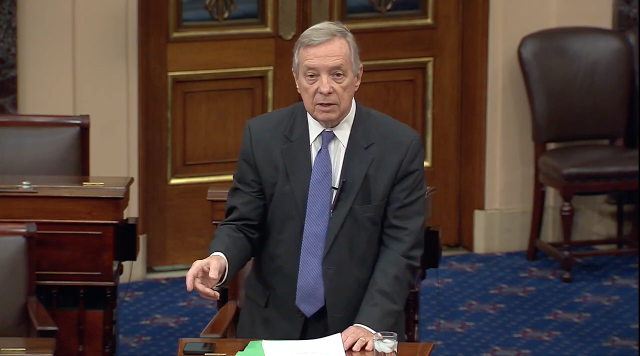
WASHINGTON – U.S. Senate Majority Whip Dick Durbin (D-IL) and U.S. Senator Todd Young (R-IN) today introduced their Congenital Heart Futures Reauthorization Act,legislation that extends funding for public health efforts at the Centers for Disease Control and Prevention (CDC) to improve childhood survival rates, prevent premature death and disability, and increase quality of life for the two-and-a-half million Americans living with congenital heart disease (CHD). Heart defects are the deadliest and most common form of birth defects—every 15 minutes a child is born with a heart defect. Today’s bipartisan legislation builds upon the law Durbin and Young passed in 2018 to expand CDC’s research and awareness efforts for CHD.
Get The Latest News!
Don't miss our top stories and need-to-know news everyday in your inbox.
“Heart defects are the most common birth defect, and if you ever get the devastating news that your precious little one has a serious medical condition, you hope there’s a treatment or care option for them,” said Durbin. “Thankfully, we have seen an incredible improvement in screening and surgeries for children born with heart defects—saving thousands of lives and increasing survival into adulthood. With this bill, we can improve research, data collection, awareness, and workforce training so we can establish a standard of care for the millions of Americans born with CHD.”
“Gaining a better understanding of congenital heart defects is critical to babies born with CHD and the millions of survivors living with this disease,” said Young. “I am encouraged by the progress in recent years, particularly for children with heart defects. Our bill will improve research and data collection to better increase the quality of care offered to those born with CHD.”
Specifically, the Congenital Heart Futures Reauthorization Act would reauthorize CDC’s surveillance systems to track the epidemiology of children born with CHD and conduct research; reauthorize CDC’s efforts to gather longitudinal patient data of CHD patients as they age, including information on demographic factors, health care utilization and disparities, and long-term outcomes for those with CHD; reauthorize CDC’s awareness-building activities to enhance education among the CHD patient and medical communities; and Direct the Secretary of Health and Human Services (HHS) to convene a workshop of subject matter experts to assess and report upon research gaps and workforce capacity for adult CHD patients.
In 2018, Durbin and Young led the effort to reauthorize CDC’s CHD program and expand its scope to gather epidemiological and longitudinal data on CHD patients across the lifespan, in order to improve health outcomes and reduce medical costs. Further, the 2018 reauthorization promoted awareness efforts, given that many adults living with CHD are unaware that they require specialized, long-term care, and fewer than 10 percent of adults living with complex CHD currently receive the recommended care. CDC’s program received $8.25 million in Fiscal Year 2023 appropriations, more than double the program’s funding level in 2018.
The Congenital Heart Futures Reauthorization Act is supported by the American Heart Association, American Academy of Pediatrics, Children’s Hospital Association, Conquering CHD, Adult Congenital Heart Association, American College of Cardiology, Society for Thoracic Surgeons, Children’s Heart Foundation, and Mended Little Hearts.
Pediatric CHD hospitalizations cost $9.8 billion annually. Early detection of congenital heart defects can be lifesaving. Thanks to significant strides in screening rates and surgical procedures, an estimated 80 percent of youth with CHD now survive at least 35 years. However, there is no cure. As adult survivors age, they require lifelong, specialized care, and some patients face ongoing and additional health challenges, including an increased risk of disability, co-morbidities, and premature death.
Durbin first introduced the Congenital Heart Futures Act in 2009 with then-Senator Thad Cochran (R-MS). The bill was included in the Affordable Care Act, and supported research to build a set of best practices and understanding for how to screen and care for newborns with health defects.
More like this:
